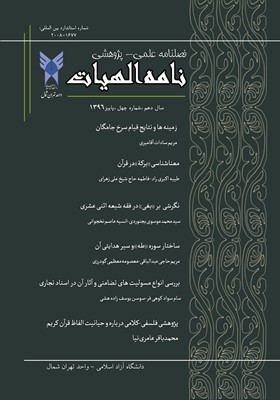Analyzing the authenticity, honor and dignity of reason in the epistemological geometry of Professor Motahari based on the text
Subject Areas : Nameh Elahiyat
Mohsen Hakemi
1
![]() ,
ensha Allah Rahmati
2
*
,
Aziz Allah Afshar Kermani
3
,
ensha Allah Rahmati
2
*
,
Aziz Allah Afshar Kermani
3
1 - Ph.D. student of Islamic Philosophy and Theology - Department of Philosophy, Religions and Mysticism - Faculty of Literature and Humanities Central Tehran Branch - Islamic Azad University - Tehran - Iran
2 - Professor of the Department of Philosophy, Religions and Mysticism, Faculty of Literature and Humanities, Central Tehran Branch, Islamic Azad University, Tehran, Iran.
3 - Associate Professor, Department of Philosophy, Religions and Mysticism - Faculty of Literature and Humanities, Central Tehran Branch - Islamic Azad University - Tehran - Iran.
Keywords: Quran, Intellect, Religious Knowledge, Rationalism, Master Motahari, language of religion, moderate rationalism,
Abstract :
The discussion of the place of reason in divine and human knowledge is one of the most challenging topics in the scientific circles of religious scholars, religious philosophers, and especially among the followers of religions. The role of intellect in acquiring knowledge has led to the creation of different sects and schools and thoughts. What is intended in this research is to evaluate the place of reason and its value in the Holy Quran. Does the Qur'an believe in the limitless validity of reason? Or does the Qur'an consider reason as a wooden foot and forbids it not only from entering into religious issues but also from thinking about human issues and problems? Is reason the only tool in understanding religion or is it a reliable source? In the Islamic world, three answers have been given to the above questions in the form of Etzali, Ash'ari, and Shia schools, which have respectively led to the appearanceists (Ahlul Hadith in Ahl al-Sunni and Shia Akhbarists), the Etzali-oriented intellect, and the Shiite-oriented intellect. The degrees of Christianity have also led to the emergence of extreme faith-based thinking and moderate faith-based thinking, and moderate (critical) rationalism and maximum rationalism. In this research, in order to find well-reasoned answers to these questions and to extract the opinions of the Quran, the opinions of the thinker Motahari Muslimi have been referred to. Motahari's opinion, arising from the Quranic point of view about intellect, is that intellect has a high position and can be referred to as pure intellect; that there is no prohibition in the Qur'an for the use of intellect, but intellect is considered as evidence and evidence.
_||_

